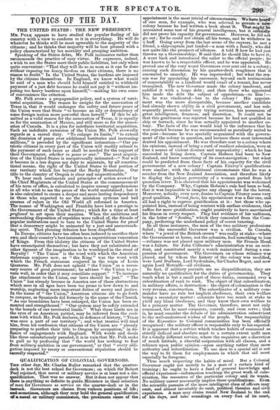TOPICS OF THE DAY.
THE UNITED STATES: THE NEW PRESIDENT. Mx POLK appears to have studied the popular feeling of his country with &view to conform to it in everything. He will do whatever he thinks will be most agreeable to the majority of the citizens; and he thinks that majority will be best pleased with a policy characterized by lax morality and grasping ambition.
Speaking of the States debts, Mr. Polk insinuates rather than recommends the practice of easy virtue. He expresses, indeed, a Wish to see the States meet their public liabilities, but only when quite convenient : "That they will $21.o so as soon as it can be done without imposing too heavy burdens on their citizens, there is no reason to doubt." In the United States, the burdens are imposed by the citizens themselves. In England, we know what would be said of a man who should hold himself entitled to withhold payment of a just debt because he could not pay it "without im- posing too heavy burdens upon himself,"—making his own sense of convenience the criterion.
M. Polk avows a propagandist policy, and a system of terri- torial acquisition. The reason he assigns for the annexation of Texas is, that it would endanger the safety and future peace of the Union were that State "to become an ally or dependency of some foreign nation more powerful than herself." If this be ad- mitted as a valid reason for the annexation of Texas, it is equally so for the annexation of Mexico, and still more so for the annex- ation of Canada. It is a plea for indefinite territorial acquisition. Such an indefinite extension of the Union Mr. Polk avowedly regards as a sacred duty. "To enlarge its limits," "to extend the dominion of peace over additional territories and increasing millions," is preceded by the significant intimation—" Our pa- triotic citizens in every part of the Union will readily submit to the payment of such taxes as shall be needed for the support of their Government, whether in pew or mar." The next acquisi- tkm of the United States is unequivocally intimated—" Nor will it become in a less degree my duty to maintain, by all constitu- tienal means, the right of the United States to that portion of our territory which lies beyond the Rocky Mountains. Our title to the country of Oregon is clear and unquestionable." To hear such sentiments and principles of action avowed by the Chief Magistrate of the United States at the commencement of his term of office, is calculated to inspire uneasy apprehensions in all who with to see the peace of the world maintained ; but it is also calculated to create a deeper and more lasting despondency in those who expected. to see the mistaken systems and bad courses of rulers in the Old World all reformed in America. The names of Washington and Franklin have lent a prestige to the Government of the United States ; which for a time at least professed to act upon their maxims. When the ambitious and encroaching disposition of republics were talked of, the friends of popular institutions used to turn to the United States for proof that a democracy might be animated by a just and unencroach- big spirit. That pleasing delusion has been dispelled. In Europe, citizens have too often been induced to sacrifice their own and their country's best interests to a superstitious veneration of Kings. From this idolatry the citizens of the United States have emancipated themselves ; but have they not substituted an- other figment of the imagination to be worshiped in the stead of Royalty? "The Union" is the word with which the American statesman conjures now, as "- the King" was the word with which the French. statesman conjured in the reign of Louis Quatorze. Mr. Polk does not uphold "the Union" as a neces- sary source of good governments he advises "the Union to go- vern well, in order that it may conciliate support." "To increase the attachment to the Union, our laws should be just." "The Union" has already become in America one of those abstractions which men in all ages have been too prone to bow down to and warship, neglecting more important duties of mercy and justice. In the name of "the Union," American citizens are to go forth to conquer, as Spaniards did formerly in the name of the Church. "As our boundaries have been enlarged, the Union has been ce- mented and strengthened." "Our system may. be safely extended to the bounds of our territorial limits." What these limits are in the eyes of an American patriot, may be inferred from the cool- ness with which Mr. Polk declares, in defiance of history, "Texas was once a part of our territory"; and what treaties will bind luni, from Ms confession that citizens of the Union are "already preparing to perfect their title to Oregon by occupation," in de- fiance of engagements with England. With words and deeds like these ostentatiously paraded, it is in vain that Mr. Polk seeks to gull us by professing that "the world has nothing to fear from military ambition in our government," or that "every obli- gation imposed by treaty or conventional stipulation should be sacredly respectM."


























 Previous page
Previous page